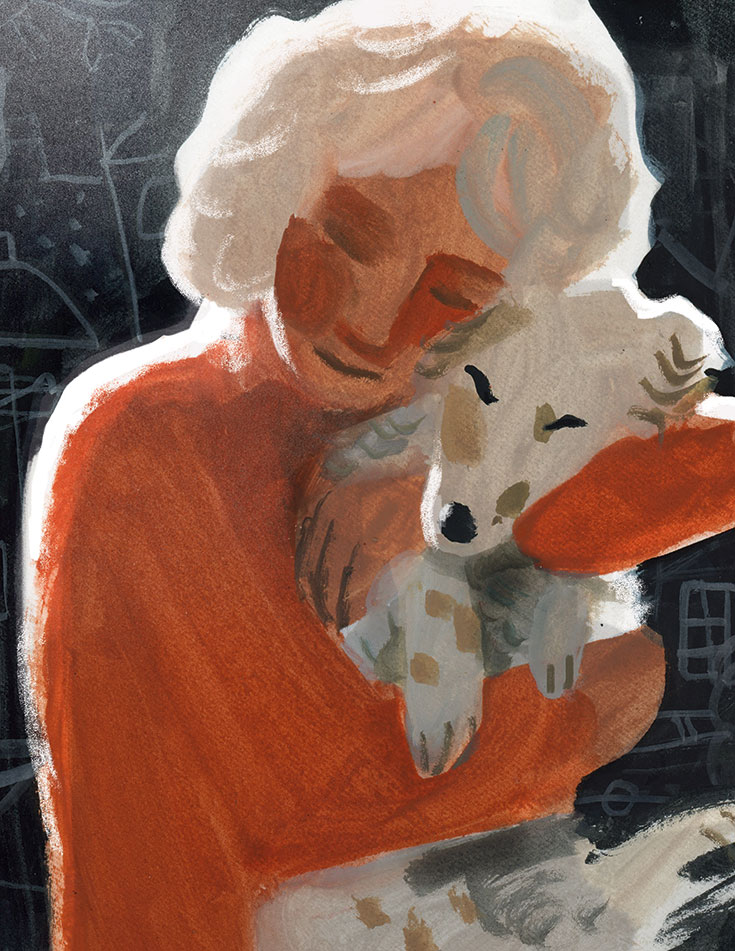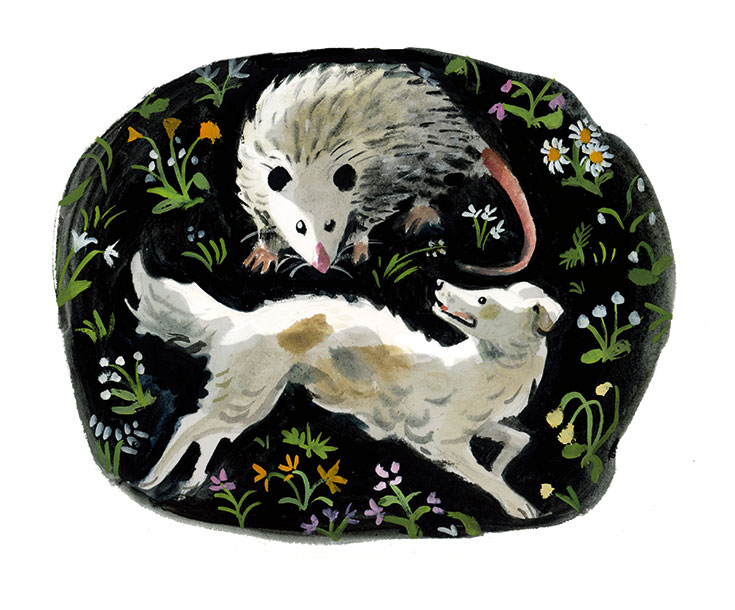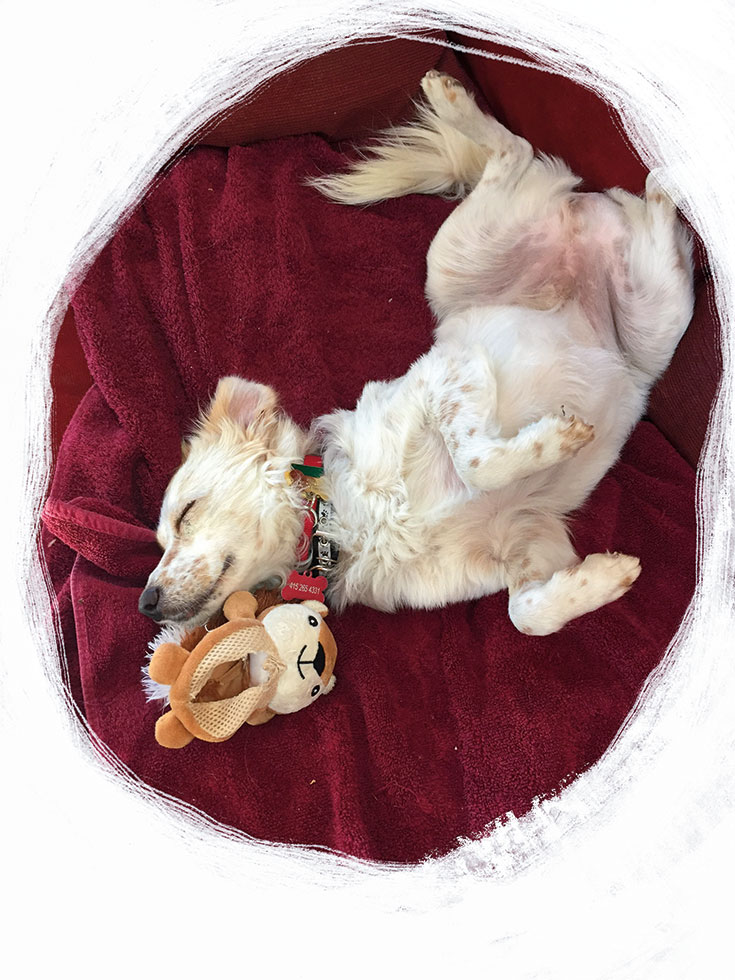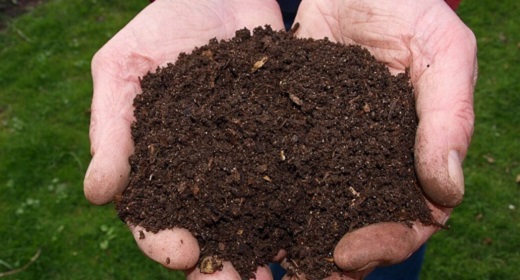by Barbara Gates: As Barbara Gates struggles to protect her adventurous dog Tony from danger, she contemplates the deep aspiration at the heart of loving-kindness practice…

may all beings be safe and protected—and wonders what real safety means in this world. Illustrations by Sydney Smith.
“Tony bolted through the open gate!” This was my husband Patrick’s shout of alarm, which sent me flying off the couch. Now, with my sock feet striking the street, I was speeding down our block, searching for our brand-new rescue pup.
“I can’t keep up,” Patrick called as I sprinted past him. Panting, he pointed toward University Avenue with its stream of trucks and cars hurtling into and out of Berkeley.
Tony had arrived the previous night after a twelve-hour van trip from Tijuana with twenty-nine other dogs. In a dimly lit parking lot, I’d received the sweet, warm bundle, his heartbeat thrumming in harmony with mine. All night, I’d clasped him to me—only, inconceivably, to lose him in the morning.
As if on split-screen, I had a moment’s view of myself: a seventy-five-year-old woman with a blaze of silver hair, no shoes, galloping zigzag through a surge of cars. I found myself leaping over fast-food cartons, broken bottles, a blown-out tire, past men and women in masks. Masks? My palm to my face. No mask. I pulled up my turtleneck to cover my nose and mouth as I ran. Again and again, I shouted through the cotton fabric, “Have you seen a small white dog?”
A woman in a sari pointed, “Yes! That way!”
I kept following pointing fingers. I ran past Victorian houses, past stucco bungalows. I breathed in local smells—jasmine, garbage, sage, curry, skunk—or was it marijuana? My mind tilted and spun.
Way down a quiet street, I saw a young woman. I shouted, “Have you seen a pup on the run?” A train hoot blocked her reply. I shouted again, “Did you see…?”
Between hoots she answered, “Yes! My neighbor has your dog!”
Oh my God. Insides tumbling. My foot hit a metal can, sending it clinking into the storm drain, reminding me I wasn’t
wearing shoes. “Where?” I asked.
“Down that block and turn right into the alley.”
Was it then I started to weep?
I found myself in a tiny cul-de-sac. At the far end, up a dark stairwell, huddled in a doorway all alone, cowered a little white dog. No neighbor. I rushed up the steps and collapsed next to him. Tony. I whispered his name. He kept shivering, no sound, no movement. Did he recognize me? Oh, Tony. I drew him into my arms.
Holding him close, I began to walk—houses, trees, passersby melting behind me. In this dreamlike sequence, I made my way home, with Tony’s hot body molded to mine, my head bent over him, lips kissing silky ears.
While Tony had only just arrived in Berkeley, we’d “connected” with him several months back when a rescue group offered us this two-year-old foundling. Patrick and I had all but given up on finding a puppy. We’d filled out countless online applications, but rescue dogs were hard to come by during the pandemic. Finally, I found a rescue group in Mexico with a number I could actually call. I rang up and bonded with the zany, dog-loving director in California who promised to find us a pup. Within days, she sent me a photo and a mini-video of a spirited little cream-colored dog with floppy border-collie ears.
Something in Tony was intensely familiar. Wasn’t I an animal too, compelled by hungers and fears?
I’d fallen in love with Tony before he even arrived. My family had always included a dog, and home didn’t feel like home without one. I longed to cuddle and protect.
After Tony’s big escape, we began frenzied projects to keep him safe. Contemplating “safety,” I set up a FaceTime call with Ajahn Amaro, a beloved mentor, who said to me: “If you look for permanence in that which is impermanent, certainty in that which is uncertain, you are bound to suffer. There’s no true refuge except Buddha, dharma, and sangha. But you can take basic measures—you can arrange things so you create as much safety as possible.”
“That’s what we’re doing,” I told him.
We mended every fence, plugged holes, refurbished latches, added carabiners, hammered broken slats, laid slate where digging paws might tunnel, posted signs on the gates: “PLEASE CLOSE.”
Then, after we’d sealed every crack, we released a jubilant Tony into our backyard. His body was a flash of dappled cream, his silky ears fluttering, his tail upright and curled forward like the plume on the helmet of a Spartan warrior. He raced from entrance to entrance, slammed his body against the gates, exploring every corner.
Tony snuffled with increasing urgency along the base of our deck, scratching the outside, trying to access something inside. Over the thirty-two years of our residency here, racoons, rats, and mice had made nests and hidden their litters in the tangled jasmine, which had taken over the under-regions of the deck. Some creature was there now, and
Tony was hell-bent on getting at it.
One evening Patrick shouted, “A big rat just scuttled under the deck.”
“No!” I disputed.
“Yes! A bulbous grey body, a long scaly tail.”
The rat must be the object of Tony’s desire!
A text with neighbors revealed this was not a rat, but a possum. Vector Control informed me that possums are not rodents, but marsupials. They’re great mothers with pouches where they can protect their babies, called “joeys,” just like their baby kangaroo cousins. The inspector told me possums hunt mice, rats, and snakes, and eat dead carcasses of all kinds as well as pests, such as ticks, cockroaches, slugs, and snails. Possums are to be protected, never to be exterminated. Possums are our friends.
But what about Tony’s safety? Could he get hurt in a fight with that possum? End up trapped trying to reach its nest under the deck? Did I have to keep him on leash—even in our own yard? I couldn’t, I convinced myself and unhooked Tony’s leash. He careened out into the garden, sped straight beneath the high portion of the deck, and disappeared.
High pitched squeals raised the hairs on my neck. Panicked, I ducked to follow him under. “Tony,” I called. Silence.
I dropped down and edged forward as far as I could, skinning my knees, scratching my arms, getting ensnared in the jumble of jasmine. “Tony, come out,” I pleaded. Only silence.
Patrick crawled under, and I shimmied out. “Ahhhh,” he drew in his breath, “I hear Tony whimpering.” Patrick tore back the jasmine to get at the dark space beneath the flooring. Suddenly he called out, “There he is! He’s stuck.”
I called 911. “We come out for people only. Not dogs. Not cats,” they told me.
As Patrick clawed at the vines, I called again and pleaded with a second dispatcher, then a third. Me, shouting: “He may not be a human, but this is a member of my family!” The third dispatcher softened, “Okay, ma’am, I’ll call the Humane Society. Maybe they can help you.”
Meanwhile, I kept stooping down, yelling under the deck. “Tony. Oh, Tony!” I berated myself: “It’s my fault. I should have trusted my instinct to keep him on a leash. How could I have put him at risk?”
From the other side of the back fence came the voice of our neighbor. “You need some help?” Patrick knocked on the boards above him to mark the spot. “The pup’s a few feet from me.” There was a high-pitched whirr as our neighbor operated an electric saw with the precision of a surgeon doing a C-section. As he pried back the severed board, out wriggled Tony, still caught in tangled vines. I extricated Tony, clasping him once again to my chest, his twenty pounds of aliveness heavy in my arms.
When he wasn’t getting himself in trouble, Tony won hearts. On the street, day laborers sitting on the steps of the church called out to him, “Hola, Antonio!” At home, Tony was a lap-lover and a supreme napper, who snuggled on the couch, pressed close to me or Patrick. We tried to keep this sweetie protected from harm, but Tony always found his way under and into things.
One day, Patrick said, “We’ve had another adventure. Tony killed a possum. I heard a thrashing sound and went out to the yard. There was Tony whipping his head from side to side, with a creature swinging from his mouth. He dropped a dead possum in front of me.” A pause. “There was a hole in its throat, and blood. I put it in the trash.”
Patrick’s and my eyes met, and I felt a sick heave in my throat.
For our morning walks, I started taking Tony to a park by the bay. Fed by creeks descending from the hills and a breakwater system channeling bay water under the freeway, this human-made pond provides a stretch of wilderness for
waterfowl: mallards, Canada geese, pied-billed grebes, and egrets.
Tony gave a yank toward every squirrel. He sniffed and dug. Meanwhile, I thought about safety. The adventures with Tony felt scary. Could I see them as humorous as well, as emblematic of all my frantic gyrations to direct the uncontrollable? We went all out to protect him from rushing into danger, outside, beyond the fence, only to have him dive into danger, inside the fence, under the deck. Hadn’t I been training on the meditation cushion for many years—learning that I cannot control experience, that loss is in the nature of things? There is no safety in the mutable world.

Efforts to protect cycled in my thoughts. The possum protects her joeys in a pouch, sheltering them until they are ready to enter the nest she has made beneath the deck. One day a rescue pup, transported by potent scent and driven by instinct, squirms under the floorboards to decimate the nest. I thought of the cycles of living, killing, eating—as we feed on one another in this birthing/dying world. No nest is truly safe.
The year our twenty-four-year-old, Caitlin, took off with her best friend to travel around the world, I became consumed with worry. In my meditation, I struggled to live with the uncertainty of what was beyond my control.
On a two-week retreat in the California desert, I strove to calm my mind, to make myself cozy with self-kindness, repeating the loving- kindness chant: May I feel protected and safe. May I feel contented and pleased. This was followed by a second set of verses: Just as I wish to be safe, Caitlin, may you be safe. Just as I wish to live with ease, Caitlin, may you live with ease.
As I chanted, I rested in what felt so safe—the silent hush of the hall, the cushioning of mat and pillows. I drew my protective shawl close. I wished this protection for Caitlin.
One evening, a visiting Zen priest joined the teachers on the dais. I recognized him from my visits to his Bay Area center, where black-robed Zen students sat lined up in strict rows on black zafus facing blank walls. I heard him ask one of our retreat teachers. “What’s going on in this hall?” He pointed to the meditators—on their benches and mats, special chairs and piles of pillows, all tucked into their shawls and comforters. He paused, then, in a charged whisper, he said, “There is no nest!”
I took it in. There is no protection from inevitable pain and loss. Wasn’t I kidding myself if I prayed for safety?
What a struggle it is trying to keep everyone safe. Keep Caitlin safe from dangers near and far. Keep squirrels safe from Tony, and keep him safe from himself, still untrained and fervent in his pull toward rats, possums, and all the critters he feels driven to hunt and chase, oblivious to the risks to his own life.
One morning, it came to me: something in Tony was intensely familiar. Wasn’t I an animal too, compelled by hungers and fears?
I saw myself scrambling after Tony when he got stuck under the deck, how I shouted and called 911. It’s not the urgent focus, certainly not the impulse to help, that I would change. It’s the panic, the compulsion to act. I saw myself react when I might respond. Who knows what is going to happen to Tony, to anyone? Perhaps I can learn to receive what happens with more equanimity. Noticing, responding, and making choices based in awareness—that’s what is taught in mindfulness training.
Increasingly I saw myself in Tony. In his run through the streets, lost in unfamiliar terrain and crazed with fear, I knew my own fevered runs to escape what scares me, including the most fundamental truths—that Patrick and I are getting old, that I and all those dear to me will die. In Tony’s compulsion to chase and seize the possum, I knew the intensity of my own drives, those fueled by fear and desire—an urge to protect myself and “my own,” a hunger for appreciation and love.

Photo courtesy of the author.
My friend, Vipassana teacher Nikki Mirghafori, reminded me that the main purpose of loving-kindness practice is to incline our hearts toward care. We express a wish for safety from outer harm—natural disasters, accidents, pandemics—knowing that external events are ungovernable. But even more importantly, we intend a wish for protection from inner harm—the harm we cause ourselves and others through our thoughts and actions. She asked if these phrases were useful:
“May I be safe for myself. May I be safe for others.”
A bolt of insight. Was I safe for others, for myself? No! I wasn’t always safe for others or myself because of my impulsiveness and bad temper. I saw how easily I tend to react—sometimes flaring in anger, at Patrick, at friends—and how harsh I can be with myself.
These phrases wishing for inner safety prompted a radical shift in my understanding. Throughout my life I have often been driven by fear, struggling to achieve safety. Through meditation practice, I began to see that I was trying to control what was ultimately uncontrollable—to win safety from the everyday hazards of life, from illness and death.
But the phrases addressing inner safety allowed for impermanence, for insecurity, yet invited a change in my way of holding that insecurity. Instead of wishing myself safety from dangers, I could intend to make myself less dangerous.
Something inside me thawed. There were new aspirations for what I might learn, what meditation might reveal. With Tony, with family and friends, in everyday exchanges, in emergencies: May I look as I run.
Each morning I wake up at 6 a.m., feed Tony, and let him out in the yard where he dashes under the deck checking for possums. After that, with my prodding, he practices “sit,” “stay,” and “leave it.” Then I sit in meditation, teaching myself to be more equanimous in the face of the uncontrollable and uncertain, to respond instead of react. Tony and I go out for our neighborhood walk, and as we do, I experiment, slipping in Nikki’s phrases with my steps: “May I be safe for me.” “May I be safe for others.”
I listen to my words echo through the streets.








































